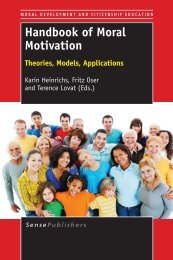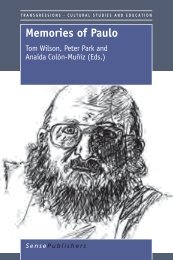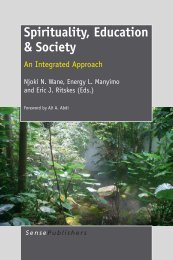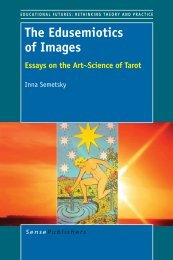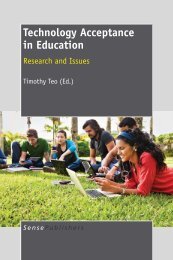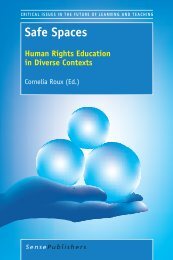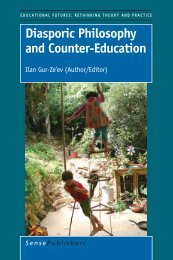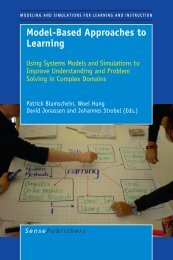Rupturing Concepts of Disability and Inclusion
Rupturing Concepts of Disability and Inclusion
Rupturing Concepts of Disability and Inclusion
You also want an ePaper? Increase the reach of your titles
YUMPU automatically turns print PDFs into web optimized ePapers that Google loves.
CONCEIVING A QUILT: CREATING A METHOD<br />
relationships; <strong>and</strong> in so doing, exposes the rigidity <strong>of</strong> the metanarrative <strong>of</strong> the<br />
Enlightenment for its unashamed exclusion founded on the capacity <strong>of</strong> abstract,<br />
arelational reasoning. The narrative challenges the tradition to treat thought as an<br />
“instrument <strong>of</strong> reason” by which its efficacy is “measured against the laws <strong>of</strong> logic<br />
or induction”; <strong>and</strong> by which its form is “reducible to machine computability.” 138<br />
My narrative prologuing this research is an expression <strong>and</strong> interpretation <strong>of</strong><br />
my unique experience, my unique positioning, <strong>and</strong> my unique relationships. The<br />
interpretations <strong>of</strong> these inform <strong>and</strong> illustrate, <strong>and</strong> invoke the use <strong>of</strong> the imagination<br />
for a different social reality. My narrative embraces Bruner’s notion that “a life as<br />
led is inseparable from a life as told” or life is not only how it was, but how “it is<br />
interpreted <strong>and</strong> reinterpreted, told <strong>and</strong> retold.” 139 For a metaphorical patchwork<br />
quilter, the narrative is not separate to the quilt - in the same way as one cannot tell<br />
“the dancer from the dance”. 140 The narrative is the very essence <strong>of</strong> the quilt.<br />
Arthur Frank highlights the implications for ethics in the sharing <strong>of</strong> narrative<br />
when he states, “Narrative teaches that being human is the perpetual finding out <strong>of</strong><br />
what is good <strong>and</strong> virtuous, whether the process <strong>of</strong> that moral inquiry is called the<br />
examined life or reflexive monitoring.” 141 Guy Widdershoven <strong>and</strong> Maree-Josee<br />
Smits declare that, although narratives can illuminate underst<strong>and</strong>ing <strong>of</strong> participants’<br />
experience, their capacity to make an ethical evaluation is somewhat opaque. 142<br />
However, they also contend that stories are not just literary creations: 143 they are a<br />
central element <strong>of</strong> life itself. Accordingly, stories embody actions <strong>and</strong> practices, in<br />
which teleological notions are considered <strong>and</strong> evaluated for their usefulness in<br />
contributing to the common good <strong>and</strong> living with others in social conditions that<br />
are just. 144 Narratives evoke moral witnessing, which, in turn, continually configure<br />
the moral self. Frank states:<br />
The moral imperative <strong>of</strong> narrative ethics is perpetual self-reflection on the<br />
sort <strong>of</strong> person that one’s story is shaping one into, entailing the requirement<br />
to change that self-story if the wrong self is being shaped. 145<br />
A patchwork quilt is also multivocal, for practices <strong>and</strong> narratives involve different<br />
voices. The quilt in an ethical context, whilst capturing <strong>and</strong> expressing stories <strong>of</strong> its<br />
maker; must also be obliged to upholding the integrity <strong>of</strong> the participants <strong>of</strong> the<br />
stories. 146 Christopher Newell warns that potential misuse <strong>and</strong> unethical use <strong>of</strong> the<br />
narrative in appropriating ethical decision-making, can lead to injustice <strong>and</strong><br />
misappropriation to those whose stories are encountered. Newell challenges us <strong>and</strong><br />
reminds us <strong>of</strong> the inherent danger <strong>of</strong> treating the participants <strong>of</strong> the narrative as<br />
means to an end, rather as an end in themselves. 147 To be ethically responsible,<br />
then, requires that although the quilter’s voice frames the context, it must be<br />
sensitive to the challenge <strong>of</strong> not speaking for others, but speaking out for others<br />
with the respect <strong>of</strong> mutuality. 148 To emphatically espouse my position, I do not<br />
presume that my interpretation <strong>of</strong> the events <strong>of</strong> my narrative are confluent with the<br />
memories <strong>and</strong> interpretations <strong>of</strong> others within the story; <strong>and</strong> I, at no point would<br />
want it assumed that I speak for these others. However, I do ‘speak-up’ for them,<br />
by telling stories which break the silence about their lives, <strong>and</strong> the obscurities <strong>of</strong><br />
their histories.<br />
31




